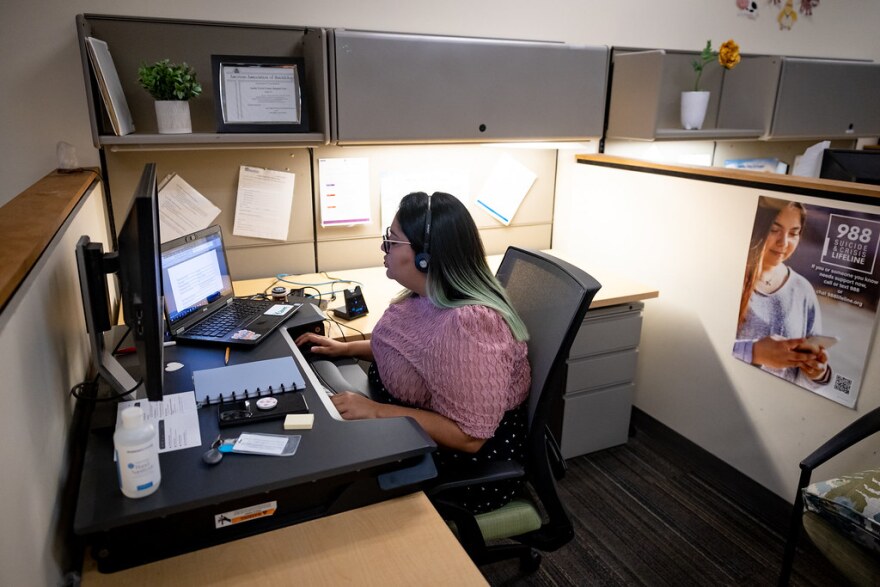If you or someone you know is struggling with a mental health crisis, call or text 988 for free confidential support.
One year ago, a three-digit number opened up for callers in distress across the United States: 988. It became the number for the newly re-named Suicide & Crisis Lifeline, formerly known as the National Suicide Prevention Lifeline.
Now, 988 connects more than 200 crisis centers across the country, including Travis County’s mental health authority, Integral Care. The hotline accepts calls in both English and Spanish.
Just last month, 988 call operators answered 11,500 calls in Texas, averaging 371 calls per day. Integral Care, which began answering calls to the toll-free hotline in 2012, saw a 50% increase in call volume over the past year.
Dawn Handley, the organization’s chief operations officer, credited the easy-to-remember number for the uptick at a 988 anniversary event this week at Integral Care’s Dove Springs clinic.
“Our call volume has gone up because people are more aware,” she said. “The more we talk about it, the more that volume will grow.”
Resources are being stretched, however, as more calls come in from the 76 counties the call center serves. Only around 84% of calls to the center are currently answered, Hadley said. To meet demand, she said, the center needs to increase its 50-person frontline call staff by around 20%.
What happens on a call
Missing a call to 988 could mean someone in crisis goes without vital support.
Nicole Warren is an administrator for Integral Care’s 24/7 helpline, which fields local 988 calls as well as calls made directly to Integral Care via the number 512-472-HELP (4357). She said callers seek support for a range of challenges — from relationship stress to loneliness to thoughts of suicide or self-harm.

“If somebody phones in, first and foremost, we share space with them,” Warren said. “We listen to them … and if they’re wanting some additional resources, we can absolutely provide that.”
The next step is to create a safety plan for the caller, if needed. This may include scheduling a follow-up call to check in. Other times, Integral Care sends out a mobile crisis team to be with the caller in person. They might also be connected with a mental health clinician at an outpatient facility.
“When someone is in that acute, intense crisis, if they can just get through that moment, that is such a key piece of it,” Warren said.
In rare cases where the caller is believed to be immediately at risk and will not agree to safety measures, police or emergency medical services may be involved, according to the federal Substance Abuse & Mental Health Services Administration, which oversees the Suicide & Crisis Lifeline. Handley said Integral Care’s call center was able to resolve 97% of 988 calls it responded to over the phone last year, however.
Integral Care is also working on expanding its capacity to field texts sent to 988. Currently, many Austin-based texts sent to the hotline are processed by national hotline employees, not local staffers, Warren said. She said adding staff who specialize in text response will not only ensure quicker connections to local resources, but also build support for a younger demographic.
“We know that the suicide rate is quite high with younger people, so this will really give us a great opportunity to help people and to connect with them,” Warren said.
Austin’s model
Austin residents have several options when seeking help for a mental health crisis. Since 2021, callers to 911 have been asked whether they need help from “police, fire, EMS or mental health.”
Handley said Austin 911 had received 10,000 calls for mental health assistance as of May, and that the option has bolstered cooperation between Integral Care and its partners in local law enforcement and EMS. She said Integral Care has helped train first responders and police to respond to mental health calls, and also provides its own staff at 911 call centers. Integral Care staff are also available to be dispatched into the field.
“This will ... reduce the amount of interaction with the criminal justice system,” she said. “It also helps emergency departments by decreasing the number of individuals going to [them] for a mental health crisis.”
SAMSHA representatives at the Dove Springs event held up the cooperation between local resources in Austin and Travis County as an example for other municipalities navigating their communities’ mental health needs.
“This is a model worth shining a light on for the rest of the country to see. You all should applaud that,” said Monica Johnson, director of the 988 and Behavioral Health Coordinating Office at SAMHSA.









